
Features:
The DSO cooled camera line is the most advanced product line in Player One history. We started the project in 2021, and through many modifications and rebuilds we made this final version. It brings our newest technology and design to everyone, we are very proud to introduce this camera line.

Power Supply Not Included! - You can purchase here... https://www.microscopecameras.co.uk/player-one-12v-5a-power-supply-dc55-x-21mm
Drivers and softwares download: http://player-one-astronomy.com/service/software/
Manuals download: http://player-one-astronomy.com/service/manuals/
Apollo-M MAX Pro (IMX432) camera is developed by Player One Astronomy, a real cooled camera for solar imaging. Apollo-M MAX Pro camera, which adopts Sony IMX432 1.1” format monochrome sensor. The 9um pixel size accommodates a good depth of 100Ke with a total of 1.7MP (the resolution is 1608*1104), and the diagonal is 17.5mm.

STARVIS Technology
Apollo-M MAX Pro (IMX432) is based on Sony Pregius 3rd Gen technology, it is a global shutter technology used in CMOS sensors.

Format
Apollo-M MAX Pro (IMX432) has a 1.1″ format, it is the biggest sensor in the entire solar camera series currently, and this size is quite big for imaging.

Pixel size
the 9um pixel size is 1.5 times bigger than the IMX174 camera, which means it can work at a longer focal ratio, such as the SCT + Daystar filter(with 4.2X).

Cutting-edge Design
The Apollo-M MAX Pro cooled camera uses the same design as the Ares cooled series, but a little difference! It has a round body, a golden and black color scheme, and uses carbon fiber to keep weight down and a cutting-edge outlook. We also integrated the sensor tilter plate and anti-dew PCB board. This series of designs makes the camera light and cool and functional!

Front 3P and Rear 4P tilter plate
When shooting deep sky objects, the sensor tilt plate can adjust the sensor tilt angle to make the stars at the corners more rounded. Apollo-M MAX Pro camera provides both front and Rear tilter plates to fulfill all usage scenarios.

Front 3P tilter plate is the default port on the camera, we believe most users have experience with this before. It works well in a lot of basic scenarios.
The rear 4P tilter plate is an alternate part for the camera, when using the filter wheel/filter drawer and OAG with the fixed angle, it is necessary. It is also convenient for RASA users to adjust the sensor tilt angle.
The built-in high-density sponge shading pad can block the light from the side slits without any side leakage.
Carbon fiber and lightweight
The Apollo-M MAX Pro uses carbon fiber in camera housing and has been optimized for weight reduction in its structural design. The camera weighs only 420 grams, making it one of the lightest models on the market.

Deep Cooling
Player One cooled camera series uses 2-Stage TEC Cooling units, after improving the structure design to reject the heat back to the camera chamber, Camera Delta-T can reach 35-40℃.

Anti-Dew heater
In the design of lightweight cooled cameras, Player One is still pursuing perfection, any necessary features, especially the anti-dew system, are the problem that many small cooled cameras ignore.

Full Well
100Ke full well is 3 times bigger than IMX174. This feature will bring some new possibilities in imaging. What we can imagine is HDR, the Sun and prominence, or maybe the bright and dark side of the Moon.

HCG and Noise
HCG mode will automatically open when Gain ≥145, and readout noise will drop to 4.6e. And the dynamic range will rise to 12 drops again.
At 380 gain, the readout noise of the Apollo-M MAX (IMX432) camera is 2.6e, which is lower than IMX174. And full well will still be bigger than IMX174.

Amp-Glow performance
Apollo-M MAX Pro is not a non-amp-glow camera, but its amp-glow is very smooth, so we believe it will be easier to calibrate. In solar imaging, it won’t be a problem at all.
300s@gain=0, offset=10, -10 degree, Dark frame of Apollo-M MAX Pro camera: DOWNLOAD

Preview of Dark frame: Exposure=300s, gain=0, offset=10, temp=-10℃ STF auto-Stretch in Pixinsight 1.86
512MB DDR3 Cache
As an improvement, the DDR3 cache in cooled cameras is increased to 512MB. It helps stabilize and secure data transmission, effectively avoids frame dropping, and greatly reduces readout noise.
With the DDR3 cache, the camera does not have high demands on computing needs any longer, it will still have excellent performance even if it is connected to a USB 2.0 port.

Type-C Data port and Power port
The back piece of the cooled camera has 2 Type-C data ports and a 12V DC 5.5×2.1mm power port.

The main data port supports USB3.0 protocol, the camera can run 126fps under RAW8 mode. Type-C port is easier to plug in when assembling the imaging equipment at night.
When recording images, since the actual writing speed will be affected by the writing speed of the hard disk itself, when the hard disk writing speed is slow, the recording may not reach the theoretical speed. It is recommended that you use a high-quality solid state drive to record data to give full play to the performance of the camera.
The camera has a 12V DC5.5*2.1mm port to provide enough power to the TEC cooling system. If you don’t need to power up cooling, only need to connect the main Type-C port, the camera will work as an uncooled camera.
Standard Cable Usage

Cooling System and Anti-Dew Heater
In the ASCOM window, we provide 3 adjustable parameters: Target temperature, Fan Speed, and Anti-Dew power.
Standard Delta-T : 35℃-40℃(Long exposure mode), 30℃(Video mode), when ambient temp 30℃, fan speed 100%, dew heater 1%.
Recommend Delta-T settings: 30℃-35℃ below ambient, fan speed 50-70%, dew heater 10%, power consumption 40- 60%.
The rotation speed of the cooling fan is also adjustable, the default value is 50% speed.
Dew problem is the biggest enemy in astro imaging, the camera integrated anti-dew heater in front of the camera. The heat power is adjustable.

Overvoltage and overcurrent protection mechanism
Player One cameras produced by the number one player ensure the safety of your camera and other equipment through overvoltage and overcurrent protection mechanisms.
Performance
HCG open at gain=145.

Readout Noise
Regarding readout noise, we solemnly promise that all values are obtained from actual tests. And for users, you could use Sharpcap 4 for testing. SC4 has a function called Sensor Analysis, which provides a very simple way to test readout noise.
Player One wrote a tutorial on their website: https://player-one-astronomy.com/service/manuals/
If you are interested in readout noise testing, you may try it yourself, which is very simple.
Dark current
The dark current is 0.3e/s/pix at -20℃ and 0.39e/s/pix at 0℃.

Relative QE Curve

Mechanical Drawing

BFL Solutions
Following is some recommend 55mm BFL solution for this camera. If don’t consider about BFL, the connection way is various.



Package List

Specifications
| Sensor | New SONY IMX432 1.1" CMOS (mono) |
| Diagonal | 17.5mm |
| Total Pixels | 1.7 Mega Pixels |
| Max Resolution | 1608×1104 |
| Pixel Size | 9μm |
| Chip Size | 14.5mm×9.9mm |
| Frame Rate | 126FPS(12bit) |
| Shutter | Global shutter |
| Exposure Range | 32μs-2000s |
| Readout Noise | 22.9e~2.6e |
| Full Well | 100k e |
| QE Peak | ≈79% |
| ADC | 12 bit |
| Cooling Syetem | High quality 2 stage TEC cooling Componet |
| Cooler Power Consumption | 12V – 3A Max |
| Delta T | 35°C-40°C (below ambient) |
| Working Temperature and Humidity | Working Temperature: -10°C—60°C
Working Relative Humidity: 0%—80% |
| Protective Window | D32*2MM High Quality AR Plus (Anti Reflection) Multi-Layer Coating |
| Data Port | USB3.0/USB2.0 |
| Adapter | 1.25″ / M42X0.75 |
| Back Focal Length | 17.5mm |
| Diameter | 78mm |
| Weight | 420g |
| Resolution and FPS | Under USB3.0 mode
Resolution 12bit ADC
1608×1104 126FPS
More resolution options could be setup in capture softewares! |
| Lightweight Mono Option | Camera, Camera+Phoenix Wheel8x1.25+FHD-OAG MINI |
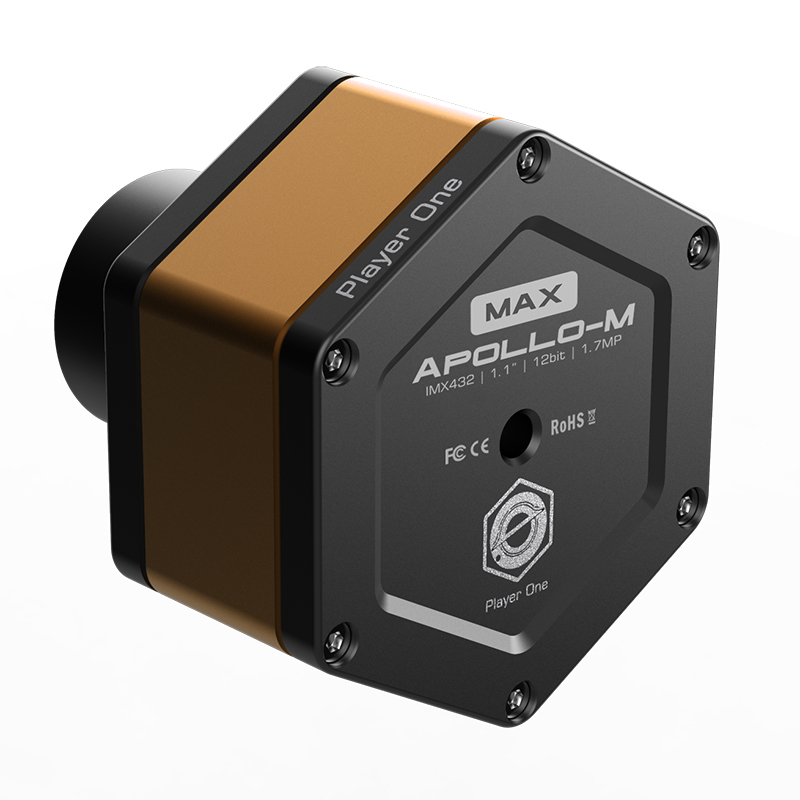
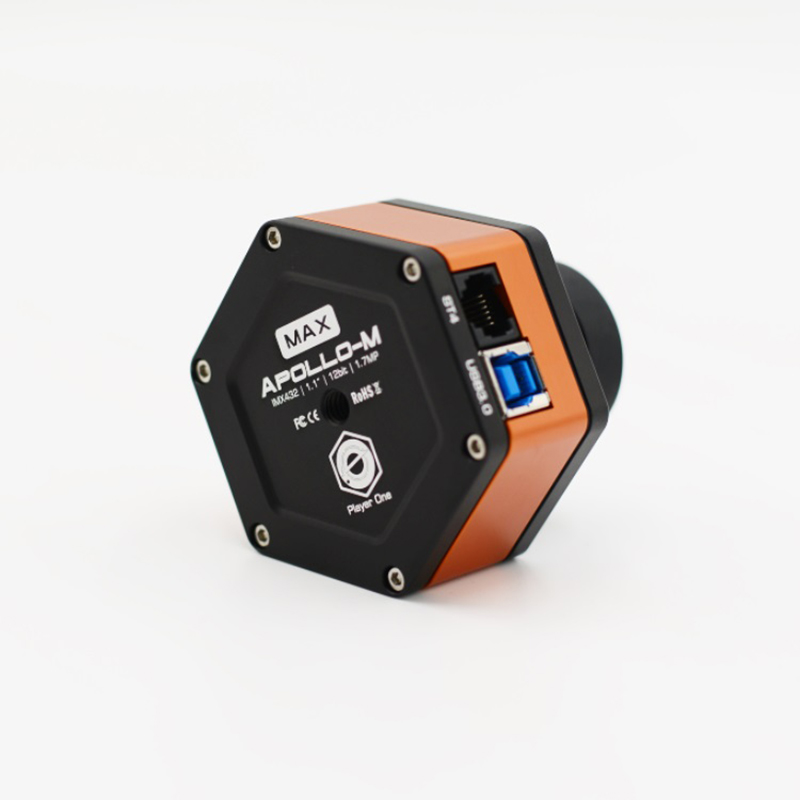
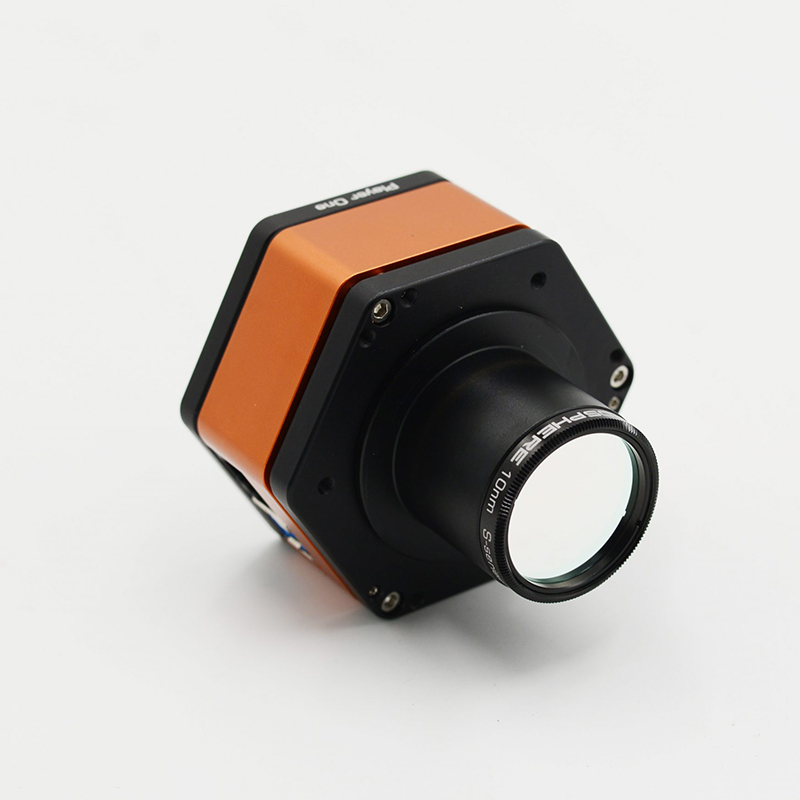
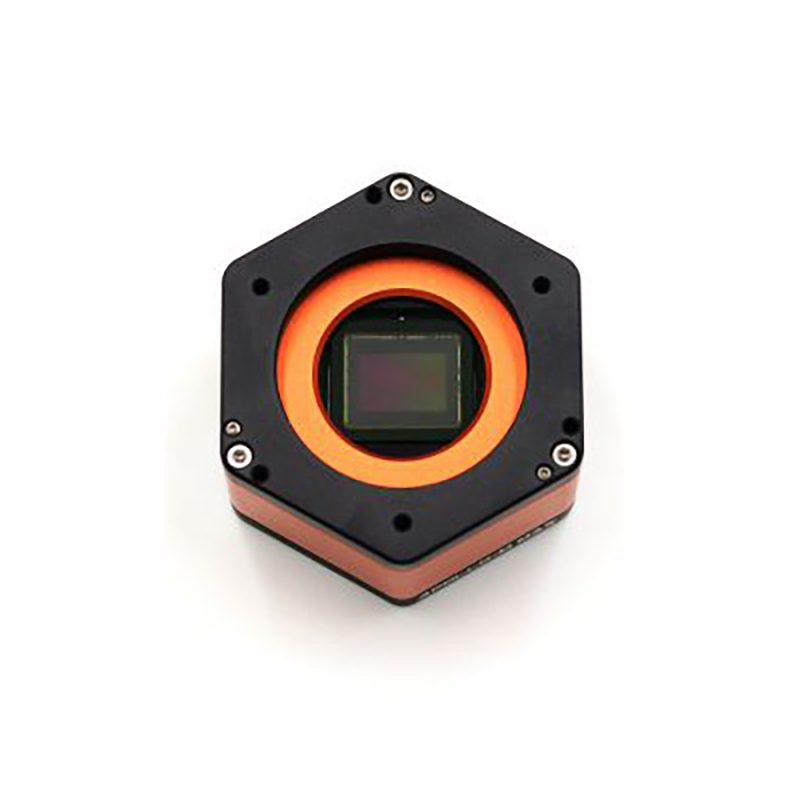
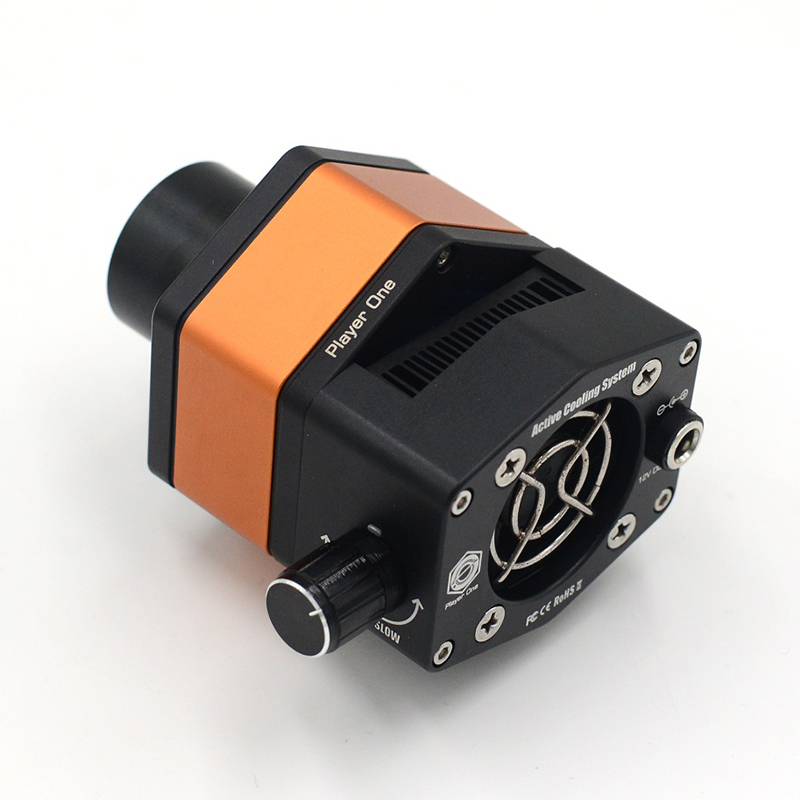
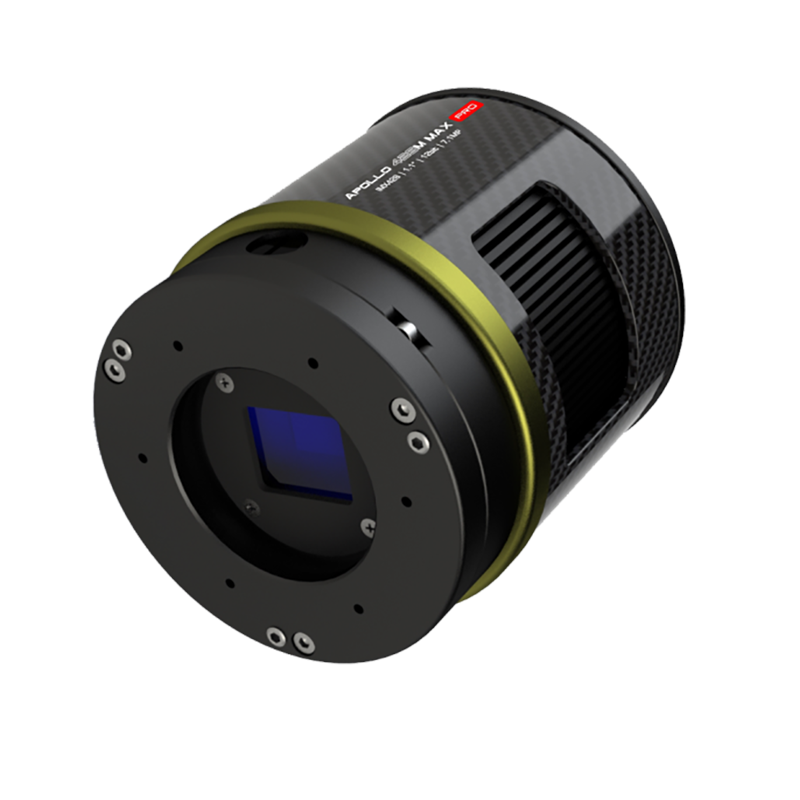
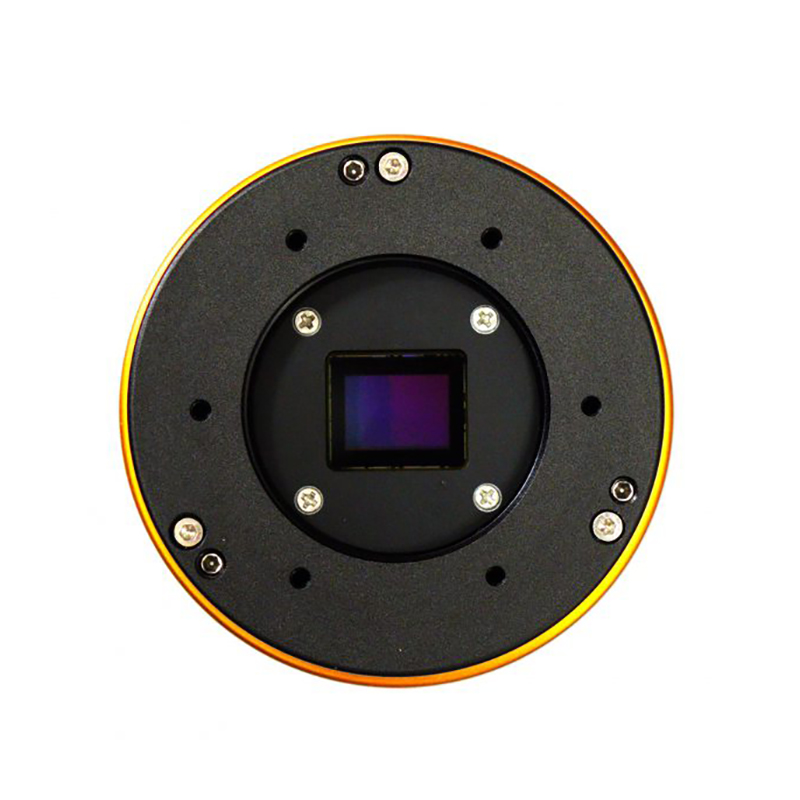
.jpg)
.jpg)
.jpg)
.jpg)